From Like a Virgin to WAP: The truly provocative pop songs
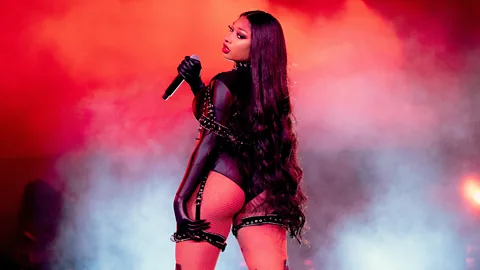 Getty Images
Getty ImagesFrom Madonna with Like a Virgin to Cardi B and Megan Thee Stallion with WAP, singers have explored what it means to be truly provocative. But, asks Arwa Haider, can explicit expressions of female sexuality in pop really be empowering?
“I always encourage people to be confident, especially when it comes to your sexuality… Maybe you’re a conservative, but everybody got a little freak inside them, you know?”
– US rapper Cardi B, interviewed in i-D, August 2020
Pop music and sex are locked in a timeless torrid clinch. In the title track from her latest album, Positions, US star Ariana Grande teases an age-old dichotomy, flitting in the promo clip between a glamorous POTUS role and a compliant partner-pleaser; on another single, 34 + 35, she sings a sugary tune with explicit intent. The mainstream fracas surrounding Cardi B’s insistently raunchy smash WAP with Megan Thee Stallion isn’t a new sensation, either; WAP may be breathlessly direct, but it also continues a long legacy of risqué and risk-taking female pop artists, and the heated reactions – empowerment, ownership, exploitation – ignited by their expressions.
The music-video age definitely brought sharp focus to such pop awakenings – and one pivotal scene came at the first-ever MTV Video Music Awards show in September 1984, courtesy of 26-year-old rising star Madonna, clad in bridal attire and a ‘BOY TOY’ belt buckle as she performed her new single Like a Virgin. Within three minutes of slinky synth pop splendour, Madonna had discarded her veil, lost a stiletto, writhed beneath a 17ft wedding cake, and sealed her place in mainstream consciousness.
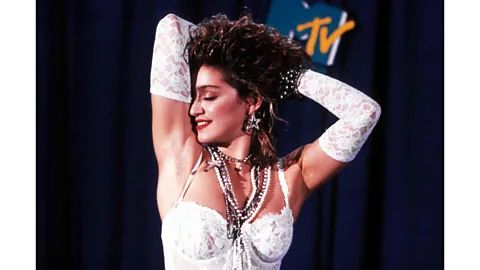 Alamy
AlamyNearly 40 years on, Like a Virgin retains a curious allure within Madonna’s formidable catalogue; it outraged the Vatican upon release, and it recurs throughout pop culture, across movie references including the ‘mansplaining’ intro to Quentin Tarantino’s Reservoir Dogs (1992), academic studies (Camille Paglia described its “coruscating polarities of evil and innocence”), and cover versions – including one by singing nun Sister Cristina, who won the 2013 TV competition The Voice Of Italy. Madonna always appeared breezy amid the furore: “I was singing about how something made me feel a certain way – brand new and fresh – and everyone else interpreted it as, ‘I don’t want to be a virgin anymore.’” she told Rolling Stone in 1987. “That’s not what I sang at all.”
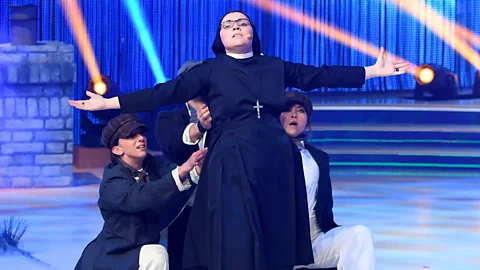 Alamy
AlamyAs a pop fan raised in the ‘80s, I was too young to originally understand what Like a Virgin was about, but I was enthralled by the music, and aware of some scandalous energy. It was a brash era and also a weirdly priggish one; female bodies were used to sell everything from cars to snacks, but sexual assertiveness was not ‘ladylike’. These conflicts have persisted; as British music journalist Lucy O’Brien writes in her excellent Madonna biography Like an icon (2018): “Many saw a continuum between advertising, music videos and soft porn, with women constantly depicted as submissive beings, there for the pleasure of men. This was why Madonna’s exploration of the virgin/whore stereotype was so incendiary – not just to the Christian right wing of the ‘moral majority’, but also to feminists, who saw it as disempowering.”
Let’s talk about sex
By the mid-‘90s, the ‘80s mainstream fixation with banning ‘racy’ records was fading (although Madonna would make statements in the early part of the decade, and reflect her LGBT culture influences with Justify My Love, Erotica, and her surreal ‘art book’ Sex). Pop was increasingly genre-fluid, and the ‘Parental Advisory: Explicit Content’ sticker that adorned many CDs seemed like a badge of honour.
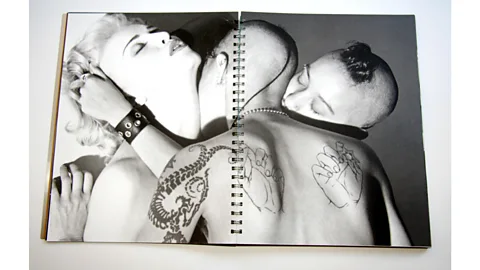 Alamy
AlamyAnother turning point had emerged in the wake of the global Aids crisis; it felt vital to discuss sex more frankly, and female artists were arguably the most fearless – 1991 classics included rap duo Salt N Pepa’s Let’s Talk About Sex and the joyous Ain’t 2 Proud 2 Beg from newcomers TLC, who wore multicoloured condoms as accessories. I became a fledgling music journalist around a time when the charts would span saucy dance novelties to sultry R&B workouts, and my first editor at London’s Time Out magazine was Laura Lee Davies: an indie spirit named after a feminist soul icon.
When I ask Davies about some of the most iconic sexually empowered pop statements from women, she reels off a thrilling playlist: The Shangri-Las’ Give Him a Great Big Kiss; Kate Bush’s The Sensual World; En Vogue’s My Lovin’ (You’re Never Gonna Get It); Neneh Cherry performing on Top of the Pops while heavily pregnant (her youngest daughter Mabel, is now a pop success in her own right).
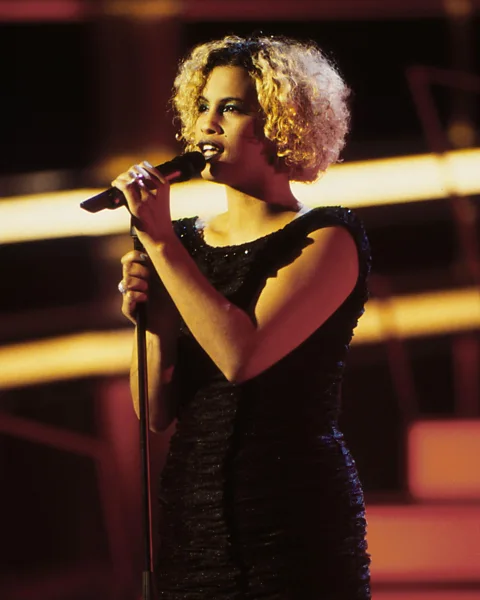 Alamy
Alamy“A lot of songs about love are really about lust and desire,” says Davies. “Now, what I like about WAP is that it really doesn’t stop; I totally understand the feeling that ‘men in this field have been so overt in talking about my body, it’s time for me to say something’ – and it’s not just a little bit of ‘hey, I’m going to play you at your game’ titillation. Cardi B has all these different ways of trying to really shove the message home. I still haven’t got my head around the bit with the macaroni…”
While WAP smashes mainstream boundaries, I still find myself questioning who gets the biggest kicks from its boldness, in an industry (songwriters, directors, CEOs) that remains largely patriarchal; as with Madonna’s Sex and Lil’ Kim’s Hard Core album (1996), the visuals fetishise female flesh (particularly non-white bodies), rather than male objects of desire.
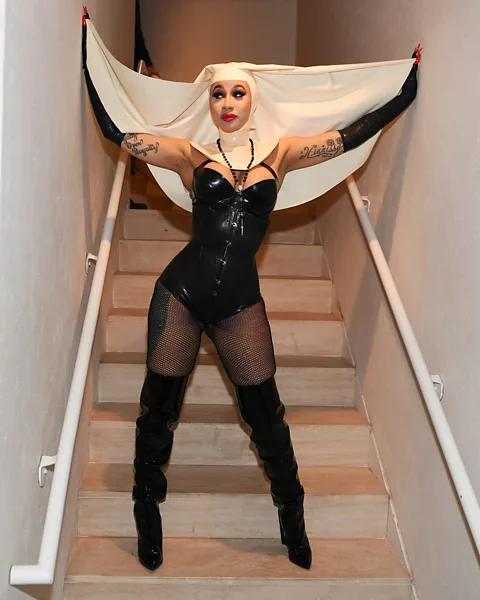 Alamy
Alamy“When Madonna did the Sex book, some people thought: ‘this is so brave, the biggest star in the world baring all’. I just thought, ‘what else have you got to show us now?’” its Davies. “It reminded me of a time when women would get the dirty joke in before men did. Obviously, women are entitled to talk about their bodies and what they want as much as men, but often, men will choose to react to that in a way that gives them the power.”
At the same time, 21st-Century pop seems to embrace a positively broad spectrum of female sexuality, including creative trailblazers like Janelle Monáe (modelling ‘vagina pants’ in the gorgeous video for 2018’s PYNK) and headstrong young stars such as Sweden’s multi-platinum-selling Zara Larsson – who, at 22, seems wowed that I’m old enough to recall the original release of Like A Virgin. “Pop music is beautiful because it’s a form of empowerment: be who you want to be,” Larsson tells me. “I’ve always looked up to women who embrace their sexuality, and I’ve always idolised strong women with big voices – Christina Aguilera, Céline Dion, Beyoncé. They represented what I wanted to be. Or when Rihanna is singing Sex with Me (2016), I love that she’s addressing the guy, unapologetically.”
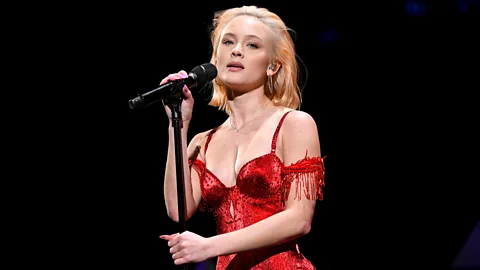 Getty Images
Getty ImagesLarsson argues that, regardless of the songwriter, just hearing women sing about sex is empowering – although she adds that there have been very contrasting traditions: “Usually, when women sing about sex, it’s like: ‘I wanna feel this’; guys are more likely to express: ‘I’m gonna do this to you’; sex is something being done to you, rather than something you’re part of. When I write songs, my favourite thing to explore is that initial attraction, when you see someone on the dancefloor, and it’s raw lust. That feeling is so fun to write about, and it’s so relatable.”
For another contemporary talent, British singer-songwriter/musician Shingai Shoniwa, fronting a band (Noisettes) and drawing from her African Bantu heritage proved an empowering experience, in advance of her exhilarating solo album, Too Bold (2020). “I’d been making music for a living since I was 16,” says Shoniwa. “Being in a group, playing bass and guitar, I didn’t feel pressure to perform for the male gaze. I was this black girl with natural hair who made my own clothes, and I was confident in the communication of the music – jazz, rock’n’roll, blues, funky house.”
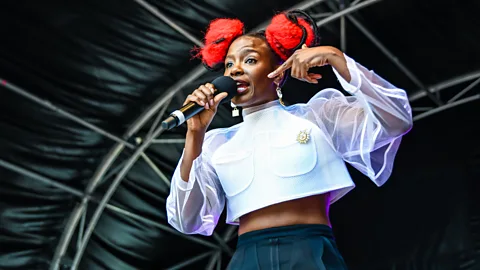 Getty Images
Getty ImagesShoniwa notes that there is still “a whiff of post-colonialism” in the commercial industry: “Every corporate machine is going to encourage black and brown bodies to be hyper-sexualised in pop music, often for a short-lived moment of success, and not to the financial benefit of these women. It means you have this conveyor belt of forgotten female talent.”
“It doesn’t help when we’re not allowed to be positioned if there’s more than one of us,” says Shoniwa, bringing to mind the current much-publicised ‘spat’ between Cardi B and Nicki Minaj. “When a lot of female talents know they might only get a year or two in this business, they might think: ‘How am I going to maximise on that?’ We’re talking about ownership of image, of beauty, of curves, of brands. And when I see how a lot of major label artists are signed now, you’re better off being self-funded. Besides Madonna, there are so many women artists that prove you can be sexually empowered without feeling like you have to sexually entertain everyone else.”
In modern pop culture, there should be space for multiple queens – and female solidarity and staying power turn out to be the most provocative moves.
If you would like to comment on this story or anything else you have seen on BBC Culture, head over to our Facebook page or message us on Twitter.
And if you liked this story, sign up for the weekly bbc.com features newsletter, called The Essential List. A handpicked selection of stories from BBC Future, Culture, Worklife and Travel, delivered to your inbox every Friday.
